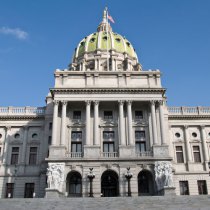Subscribe for Weekly Updates

Summer Pause a Prelude to Fall PICPA Advocacy Fights
By Peter N. Calcara, vice president – government relations
With the 2018-2019 Pennsylvania budget in the books and elections on the horizon, this summer has been unusually quiet around the Capitol. The tranquility is a welcomed change considering the last few chaotic summers. It’s been years since unresolved budget matters haven’t dominated the summer legislative landscape. State lawmakers have been out of session since the end of June, and they are not scheduled to return until early September. While the pace of legislative activity may have ground to a halt, the PICPA government relations team continues to plow ahead on a couple critical issues that we hope to get on the General Assembly’s abbreviated fall session calendar. Here’s an overview of the issues the PICPA is working on.
 Topping our agenda is getting a fix for the 1099-MISC nonresident withholding requirements. The law enacted last year (Act 43 of 2017) requires withholding, at a 3.07 percent rate, on nonwage Pennsylvania source income payments made to nonresidents. Compliance with the new requirements has been challenging and costly as taxpayers have had to implement new procedures and modify systems. The Department of Revenue nonresident withholding website is a great starting point for a fix, but certain provisions in Act 43 need to be addressed through corrective legislation.
Topping our agenda is getting a fix for the 1099-MISC nonresident withholding requirements. The law enacted last year (Act 43 of 2017) requires withholding, at a 3.07 percent rate, on nonwage Pennsylvania source income payments made to nonresidents. Compliance with the new requirements has been challenging and costly as taxpayers have had to implement new procedures and modify systems. The Department of Revenue nonresident withholding website is a great starting point for a fix, but certain provisions in Act 43 need to be addressed through corrective legislation.
House Bill 2413, sponsored by Rep. Keith Greiner, CPA (R-Lancaster), is pending in the House Finance Committee. This bill seeks to provide greater clarification and guidance to last year’s 1099-MISC nonresident withholding requirement. HB 2413 addresses three major problem areas for practitioners and taxpayers:
- The Creeping $5,000 Threshold -- The law does not address the instance where a taxpayer reasonably does not know whether the $5,000 threshold will be met at the time of a payment, but subsequently exceeds that threshold. HB 2413 expressly addresses when a payor is required to withhold in instances where it does not anticipate making payments of at least $5,000 at the time of the first payment.
- Protection of Payors Acting in Good Faith -- Protection is needed in instances where the allocation/apportionment of a payment is needed to determine how much of a payment is made for services performed both within and without Pennsylvania. The bill protects taxpayers acting in good faith from the imposition of tax, interest, and penalties.
- Safe Harbor Apportionment Rules -- There is a need for specific rules for determining how much to withhold on nonemployee compensation payed to nonresidents for services performed both within and without the state. The payee may have to compute taxable income in a different manner on his/her tax return. However, the payor may not have all the relevant information at the time withholding is required.
A second PICPA-supported bill deals with income tax reporting for estates and revocable trusts. House Bill 2303, sponsored by Rep. Michael Corr (R-Montgomery), was unanimously reported by the House Finance Committee on June 20, but lawmakers adjourned before a vote on the bill.
The bill would allow the executor of an estate and the trustee of a qualified revocable trust the option to treat the trust as part of the estate for all taxable years after a decedent's death, rather than as two separate entities. Currently, the state Tax Reform Code requires a decedent's estate and revocable trust to file a separate Form PA-41 to report income earned by each during the year. Federal law allows the estate of a decedent with a revocable trust to elect to file a single annual income tax return that reports income earned by both the estate and the trust on federal Form 1041.
The Pennsylvania House is scheduled to return on Sept. 12, and the state Senate on Sept. 24. With only a handful of legislative days scheduled, PICPA’s window of opportunity to get these proposals through both chambers and on the governor’s desk is narrow. Notwithstanding the abbreviated fall session schedule, PICPA members are urged to use what remains of the summer to reach out to their state lawmakers to share their thoughts on one or both bills.
Visit our website for issue briefs and other helpful meeting tips.







Leave a commentOrder by
Newest on top Oldest on top